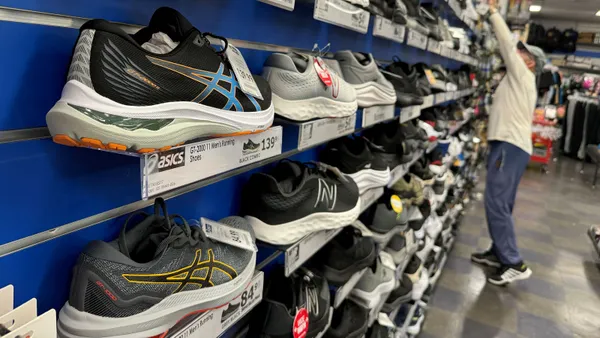Dive Brief:
-
Nike on Monday filed a motion to dismiss several of the claims in the class action lawsuit two former employees filed against it in August, including the claims for violations of the Federal Equal Pay Act, the Oregon Equal Pay Act and "intentional discrimination," in violation of the Oregon Equality Act, according to court documents.
-
The crux of the motion is that the plaintiffs, Kelly Cahill and Sara Johnston, "fail to plead sufficient factual matter" and that the "proposed class definition is so overbroad that they cannot possibly maintain a class or collective action on the facts alleged." Nike declined to comment.
-
The lawsuit was the climax of a tumultuous period at Nike, which included a slew of executive departures and an apology from CEO Mark Parker for what he described as a "boys culture" atmosphere at the sports brand and retailer. In the same motion, Nike also requested an oral argument, which Judge Jolie Russo has taken under advisement until Dec. 12.
Dive Insight:
The crux of Nike's argument is tied to two points: that not enough factual evidence was given to support the plaintiffs' claims and that the class of female employees encompassed by the lawsuit is overly broad.
"The proposed class would span thousands of female employees in hundreds of disparate job categories," the court filing reads, arguing that women in different jobs come from entirely different backgrounds and each have a unique set of circumstances. The documents later stated, "Plaintiffs plead no factual predicate that makes it plausible that all class women at Nike's headquarters share anything in common (other than their gender), let alone that they suffered a common harm on a theory susceptible to common proof."
The initial lawsuit from August claims that female employees at Nike are "devalued and demeaned" and goes into detail on several interactions that female employees had with male coworkers and superiors. Among the claims were several accounts involving sexual harassment accusations, which the lawsuit alleges were either mishandled or ignored. Despite Nike's call to dismiss several claims, the plaintiffs' attorney Laura Salerno Owens of Markowitz Herbold expressed a determination to see the case through.
"Notably, Nike did not move to dismiss the claim that Nike's policies and practices have resulted in lower pay and fewer promotions for women," Owens said in emailed comments to Retail Dive. "No matter how the court rules on Nike's request, these brave women's call for merit-based pay and promotion at Nike will continue."
So far, Nike's brand has not appeared to suffer adverse impacts from the lawsuit — the company has performed well in recent quarters and has weathered other cultural storms as well, including a controversial decision to cast Colin Kaepernick in its Just Do It campaign in September. Indeed, while the claims filed against the athletics retailer are serious — and imply a systemic problem in the company's workplace culture if found to be true — the main threat to Nike comes in how they handle the claims, according to Matt Powell, vice president and senior industry analyst of sports at the NPD Group.
"What really matters is where they go from here," he told Retail Dive in an interview. "Do they stand up and do the right thing going forward?"















